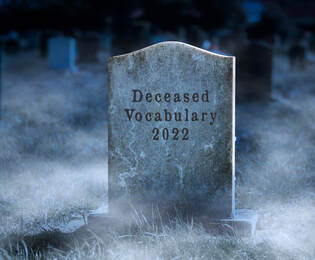 It’s been almost a year and a half since I launched my campaign to invite lost words back into our everyday English vocabulary. Since then, I trust my readers have been making every effort to include the likes of egad, gadzooks, and piffle in their daily communications, be it texts, emails, or the rare voice contact. Just to refresh memories, (I know mine needs that circular arrow more often these days) the idea to bring back the good old words arose from my daily indulgence in crossword puzzles, where a useful word like ‘alas’ was resurrected only in response to a clue. ‘Tis a pity, me thinks at the time. Where have all the “alases” gone? My aim was to make “alas” the new “Oy vey.” Whether or not I have been successful, I offer a new list of words that I believe deserve a second change. ERST. Meaning before the present time; formerly, erst is commonly used with its best friend while. But erst is perfectly capable of existing on its own! Example: Erst I was four score, I could put on my underpants from a standing position. Without holding on. ODDS BODKINS. Instead of a tried-and-true word such as weird, try using the phrase Odds Bodkins to describe something exceptionally strange. Besides sounding very clever, if a bit archaic, you might find that it’s fun to say. Example: My husband actually heard what I said the first time I said it. Odds Bodkins!! EKE. Not to be confused with the sound one might make upon seeing a rodent, this neglected word means to obtain with great difficulty. Example: The home team eked out a victory over its rival. Or: At the sample sale, I was able to eke the Chanel handbag from the pushy woman who lunged for it. YON. Like the word “erst,” yon has a BFF, which happens to be “hither.” And like “erst,” yon can also stand on its own three letters. Meaning “beyond,” or “over there,” it’s a more economical way to express distance. For example, instead of saying “I had to park my car nearly a mile away from the concert,” simply state that you parked your car yon, and save your breath for the long walk ahead. ERE. Another neglected three-letter word, ere means “preceding in time,” or “earlier than,” and its use is guaranteed to make you sound more erudite than its more commonplace cousin, “before.” Example: Running late, I hastily applied my mascara ere my dinner guests arrived. VERILY. One of my personal favorites, verily denotes positivity. Its synonyms include words such as really, surely, indeed, actually, unquestionably. So, when you are absolutely certain of something, why not consider verily? Because it rhymes with “merrily,” its use might verily bring a smile to your face! Example: No offense, but I verily believe that’s the ugliest sweater I’ve ever seen. PETTIFOGGER. Though it may sound adorable, you wouldn’t want to be labeled as one. As its letters imply, a pettifogger is one who is petty, trivial, and quibbles over the small stuff. The word is also used to refer to a lawyer whose practices may be questionable. Example: During their divorce, my friend told me that her husband’s attorney was a real pettifogger! Second Example: The other night we played the new edition of Pettifoggery Pursuit. HARKEN. Try saying “harken” as a savvy alternative to “listen,” or “pay attention,” and someone is bound to prick up their ears. Even if it’s just the dog. Example: My husband never harkens to anything I have to say! NIGH. Easily confused with the sound made by a horse, this versatile word can be adverb, adjective, or preposition. Now, how many words can make that claim? On that point alone, it deserves a second chance. Use as a substitute for “almost,” “near,” or “nearly.” Example: The other night I forgot the time and nigh burnt our dinner. HIE. A simple word that is a homophone of a greeting, and what you get when you smoke pot. But its unique meaning is to go quickly. So next time you’re in a hurry, consider hie-ing. Example: My friends and I hied to Bloomingdale’s when we heard there was a one-day sale. As before, I hope this list inspires you to be on the lookout for additional good old words that have fallen into disuse. And if you discover any, prithee, don’t hesitate to let me know. Comments are closed.
|
About the AuthorSusan is the author of two award-winning collections of humorous personal essays: “How Old Am I in Dog Years?” and “How to Complain When There’s Nothing to Complain About.” Check out her Author Page HERE. Archives
April 2024
Categories |
- Home
- Cruise News
- Gigi in the 561
- Blogs
- Video
-
Travel
- Snaps >
- Island Destinations
- October Odyssey >
- Pam - Traveling in Style
-
Road Trip!
>
- Road Trip! -- Tucumcari, New Mexico
- Road Trip! -- The Painted Desert
- Road Trip! - Sedona, Arizona
- Road Trip! - Sedona Wineries
- Road Trip! Tonto Natural Bridge State Park
- Road Trip! - Mogollon Rim
- Road Trip! - Verde Canyon Railroad
- Road Trip! - Jerome, Arizona
- Road Trip! - California
- Road Trip! - Palm Springs Celebrity Tour
- Road Trip! - Palm Springs Aerial Tramway
- Road Trip! - Festival in Palm Springs
- Road Trip! - Willcox, Arizona and Apple Annie's Orchard
- Road Trip! Willcox Wineries
- Road Trip! Chiricahua National Monument
- Road Trip! Tombstone, Arizona
- Tombstone, Part Two
- Road Trip! - Epilogue
-
Traveling With Joe
>
- Beartooth Highway
- North Cascades National Park
- A Visit to the Philippines
- Grand Canyon National Park
- Glacier National Park
- Yellowstone National Park
- Hiking in Bear Country
- Crater Lake National Park
- Albuquerque Balloon Fiesta
- The Kerrville Folk Festival
- Building Hope in the Rio Grande Valley
- Yellowstone Camping Tales
-
Unknown Yellowstone
>
- Unknown Yellowstone - Heart Lake
- Unknown Yellowstone - Summit Lake
- Unknown Yellowstone - Shoshone Lake
- Unknown Yellowstone - Grizzly Lake
- Unknown Yellowstone - Riddle Lake
- Unknown Yellowstone - Pelican Cone
- Unknown Yellowstone - Mt. Washburn
- Unknown Yellowstone - Specimen Ridge
- Unknown Yellowstone - Avalanche Peak
- Unknown Yellowstone - Divide Creek
- Contact
- Search
|
© COPYRIGHT 2024 ALL RIGHTS RESERVED.
|

 RSS Feed
RSS Feed
